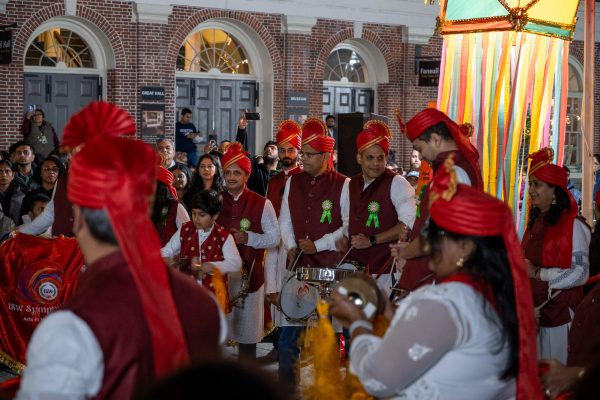
Each year, around 1 billion people worldwide celebrate Diwali, a Hindu holiday also known as the Festival of Lights. This year, hundreds of people attended the India Society of Worcester’s first-ever Diwali celebration in Downtown Boston to celebrate the holiday through performance, food, art and community.
On Saturday, ISW transformed Faneuil Hall Marketplace with Diwali banners, decorative garlands and an akash kandil lantern atop a ten-foot-tall post.
Meenakshi Vaze, a member of ISW, said the purpose of the event was to be inclusive and spread positivity. Diwali symbolizes the victory of light over darkness and good over evil, celebrating not just by Hindus but also by Jains and Sikhs.
“It’s not a religion thing. It’s more of spreading happiness,” Vaze said. “Since it’s going to get darker now, we’re trying to get a lot of light in, happiness and great food, great music and just having fun.”
The event included tables where attendees could get henna, create paper lanterns and complete a coloring page with a mandala pattern just like the festival’s symbolic rangoli.
Pratigya Saksena attended the celebration with her husband and two children. Saksena said she wanted her children to experience aspects of Indian culture through rangoli designs, dances and other activities.
“We are here to show [our children] what Diwali is because it’s always nice to amalgamate two cultures, American and Indian,” she said.
Other attendees felt connected to Indian culture through the event — like Gauri Patole, who said the celebration helped her feel connected to her home in Mumbai, India.
“Diwali is a festival of light,” Patole said. “It’s a festival of joy, and being away from home, I came here to be closer to our family and tradition.”
The event began much earlier for members of ISW, setting up tables and tents for decorations and activities in the early evening. Trishna Nikte, a sophomore at Brandeis University who has been associated with ISW since she was 3 years old, helped set up the celebration, including her own henna station.
Nikte said ISW is a family to her.
“These people are all so important,” she said. “Everyone is so in touch with their culture, and we’re trying to share that with not only the Greater Boston community but also our younger generations.”
The celebration featured a variety of performances, including youth performance groups, dhol tasha drum groups and traditional dances. Dhol tasha is a type of drumming in which performers beat at a specific rhythm in a celebration of culture, Vaze said.
“We have been practicing for over two to three years for this,” Vaze said. “It’s a mix of traditional drum patterns, and then there are new ones that we’re creating, and a lot of jam sessions happen in between. All in all, it’s come out really well.”
Ria Deshpande, a 24-year-old nurse, and Tanvi Manjrekar, a 23-year-old medical assistant, attended the festival and performed dances to some Diwali songs.
Manjrekar said performing helps her connect not only with a variety of Indian dance styles, but it also helps her further understand her own culture.
“We’re able to grasp a good understanding of all the expressions and the religious parts of the dance that have to do with Diwali,” Manjrekar said. “I’m not super good with Hindi, which is what a lot of the songs that we dance on are about, but when you dance on it, you learn the words more, and you’re able to understand the meaning more.”
The celebration was a part of a continuous partnership between ISW and Faneuil Hall Marketplace. Nina Pellegrini, the marketing manager for Faneuil Hall Marketplace, said the events ISW has put on have been well received.
“It’s really been nice to see how well the event has been picked up,” Pellegrini said. “Obviously, it’s a free event, which is another very enticing thing … It’s just really nice to see that people are interested in these cultural events.”
In addition to Diwali, ISW recently held two other events at Faneuil Hall, including one celebrating Holi in August, Vase said. ISW offers a variety of events celebrating Indian holidays and programs for children and adults to connect with their culture.
“We’re just really excited to be here and perform,” Deshpande said of the festival. “I feel like a lot of people don’t really know how Diwali works, so it’s fun to showcase our culture.”
















































































































